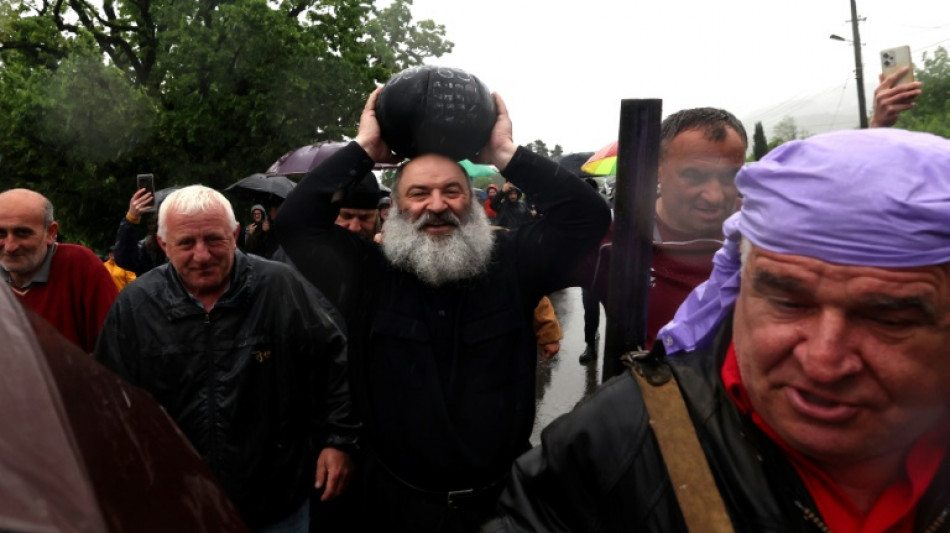

Georgia's rugby dreams built on wild folk game
Hundreds of men went charging through the Georgian village of Shukhuti as they grappled for control of a wine-soaked leather ball -- a frenzied folk game locals say is the bedrock of the Caucasus country's prowess on the modern-day rugby field.
Held every Easter, the fierce contest pits the village's upper and lower halves against each other in a bruising effort to drive the ball into a river.
Victory goes to the team that manages to hurl the ball -- stuffed with earth doused in locally made wine and weighing a hefty 16 kilograms (35 pounds) -- into the water.
Known as Lelo, the game was first played in Shukhuti in western Georgia more than 150 years ago to commemorate a historic military victory against Ottoman Turkish invaders.
Georgians see Lelo as a wild cousin of rugby, a game that has surged in popularity over the last few decades.
Fittingly nicknamed the Lelos, Georgia's national rugby team has dominated the second-tier Rugby Europe Championship, clinching the title eight years in a row.
"This is where Georgian rugby draws its passion for victory -- from the intense energy rooted in the ancient tradition of Lelo," said local mayor Alexandre Sarishvili.
National team head coach Richard Cockerill shares that sentiment.
"We're a small country with small numbers, but we're still able to put a team out that can compete with Fiji and Japan and Wales and Italy and win Rugby Europe every year," he told AFP at the squad's Tbilisi training ground.
- 'Jeopardy' -
With just 8,000 registered players -- a fraction of the numbers seen in Tier One nations -- Georgia have managed to beat the four sides mentioned above in recent years.
Their Under-20s team defeated England ahead of the 2023 World Cup.
Yet Georgia remain locked out of the Six Nations, a closed competition that hasn't welcomed a new team since Italy joined in 2000.
Former England hooker Cockerill wants meritocracy to trump tradition when it comes to the Six Nations line-up.
"We deserve an opportunity to play-off against the bottom team, to prove that we are good enough," he said, referring to Wales's ongoing dismal losing streak.
"If a team's lost 17 Test matches on the bounce and is bottom of the Six Nations two years in succession, surely at some point there's got to be an opportunity for Georgia.
"We're above Wales in the world rankings... But the gate's shut, isn't it?"
Though he admits the push for inclusion is a long shot, Cockerill argues a promotion-relegation playoff would introduce both incentive and risk -- benefitting the sport.
"There's a realistic chance that whoever wins Rugby Europe would actually put huge pressure on whoever finishes bottom of the Six Nations. If we're going to grow the game... then I think there should be some jeopardy."
- 'Containment' -
With enthusiastic public support and strong government backing, rugby is thriving on a grassroots level in the capital Tbilisi and beyond.
But Cockerill warns growth will stall without greater competitive exposure.
"We need to learn how to lose, and play as Italy have, as France did when they joined the Four Nations to make it Five Nations, as Fiji have done when they've joined Super Rugby."
He envisions a similar trajectory for Georgia, and laments that all the country's best players move abroad to play in competitive club competitions.
For now, Georgian rugby is stuck in a holding pattern.
The new Nations Cup format, which groups them with other Tier Two sides, offers no path for promotion until at least 2030.
"We're being told to wait five more years," Cockerill said. "That's not growth, that's containment."
In Shukhuti on Sunday, after hours of punishing scrums, torn shirts, and battered bodies, the men of Upper Shukhuti finally broke through and claimed a hard-won victory.
"Lelo captures the combative spirit of Georgians," said local doctor Nanuli Khalvashi, 64, who came to cheer for the Upper Shukhuti team.
"With a sporting tradition like this, it's no wonder Georgia have become a force in rugby."
X.Lefebvre--JdB



